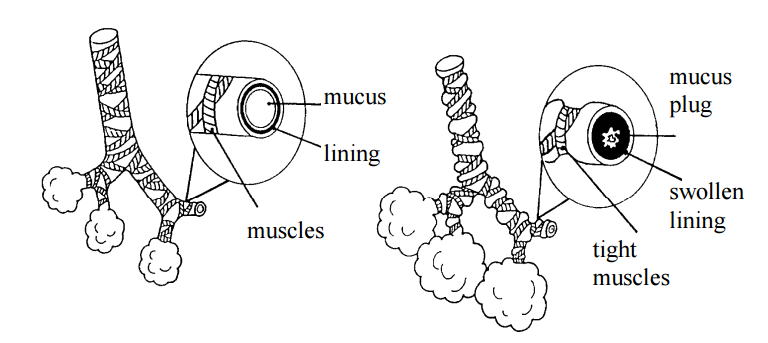Respiratory syncytial virus
Article Translations: (Spanish) (Hmong)
What is respiratory syncytial virus?
Respiratory syncytial (sin-sye-shul) virus, or "RSV," is a virus that causes respiratory infections in people of all ages. In Minnesota most RSV infections occur between October and April. Usually older children and adults will have only a cold, but in infants and young children it can cause other respiratory illnesses.
An RSV illness can be especially severe in very young or premature infants, those with heart or lung disease, and those with compromised immune systems. In infants and young children, RSV is a common cause of pneumonia and bronchiolitis—inflamed airways in the lungs. (See the education sheets "Pneumonia" and "Bronchiolitis." Older children and adults may get bronchitis from RSV.

RSV infects most children during their first 3 years of life. Immunity to RSV is short-lived, and it is common to get it again.
What are the signs of RSV?
Newborns and premature babies
- irritable (crabby)
- poor feeding
- may have slight cold symptoms such as a stuffy nose
- lethargic (very sleepy, hard to arouse)
- may have episodes of apnea (breathing stops)
Infants and young children
- coughing
- fast breathing
- wheezing
- hard time breathing
Older children and adults
- watery eyes
- runny nose
- coughing
How is RSV spread?
RSV is easily spread from person to person, especially during the first few days. A person will get the illness 2 to 8 days after being exposed to it.
People catch RSV by direct contact with respiratory secretions (saliva and mucus), or things that have been in contact with it. The virus can live on surfaces for many hours, and for a half-hour or more on the hands.
Frequent hand hygiene is the most important way to prevent the spread of RSV. All family members should wash hands well with soap and water for at least 15 seconds, or use an alcohol hand sanitizer, such as Purell®, and avoid touching their nose and eyes.
Teach children not to share food or beverages, and to cover their mouth with their forearm when they sneeze or cough.
How is RSV treated?
If an infant or young child is very ill, mucus from the nose will be tested to see if RSV is the cause. Check with your doctor about the results of this test.
Most children with RSV do not need a hospital stay. The children who do need to be in the hospital are those with other health problems or very young infants who are prone to develop pneumonia and bronchiolitis.
Most children with RSV do not need prescribed medicines. Because RSV is a virus, antibiotics do not help. When caring for your child at home, symptoms may be treated as follows:
Fever
Give acetaminophen (Tylenol® or another brand) according to package directions. Do not give aspirin.
Stuffy nose
- Raise the head of the crib.
- Buy saline nose drops at a drug store, or stir ¼ teaspoon salt into ½ cup water.
- Lay the child on the back and put 2 or 3 drops of saline into the nose.
- Wait about ½ minute and suction the nose with a bulb syringe.
- Do this before feeding and sleeping and as often as needed.
Do not give any non-prescription medicine without checking with your doctor. If your child is wheezing or has an ear infection, your doctor may prescribe medicine.
If my child is admitted to the hospital, what should I expect during the hospital stay?
- Your child may receive oxygen.
- Your child may have an intravenous line (IV) to provide liquids until your child can eat and drink well.
- Your child will be closely monitored.
- Your child may be given medicine in the form of a mist to breathe into his or her lungs.
- Your child will be placed in "contact" precautions. This means all staff will do hand hygiene and wear a gown and gloves each time they enter your child's room.
You will need to do hand hygiene each time you leave and enter your child's room.
If your child is coughing, he or she will be placed in contact and droplet precautions. All staff will do hand hygiene, and wear a mask, eye protection, gown and gloves each time they enter your child's room.
When should I call the doctor?
- a child younger than 1 year old with heart or lung disease develops a cold
- refusing to drink
- vomiting, not able to keep liquids down
- pulling at the ears
- hard time breathing
- wheezing or gasping for air
- breathing fast (more than 60 times per minute)
- hard time staying awake
- sucking in on the spaces between the ribs with each breath
- has a bluish or grayish tinge around or inside the lips - call 911
When can my child return to day care?
Children may return to day care and other group activities when they have no fever, feed normally, and feel well—even if they still have a cough or a runny nose.
Questions?
This sheet is not specific to your child, but provides general information. If you have any questions, please call the clinic.
Children's Hospitals and Clinics of Minnesota
Patient/Family Education
2525 Chicago Avenue South
Minneapolis, MN 55404
Last Reviewed 7/2015 © Copyright
This page is not specific to your child, but provides general information on the topic above. If you have any questions, please call your clinic. For more reading material about this and other health topics, please call or visit Children's Minnesota Family Resource Center library, or visit www.childrensmn.org/educationmaterials.
© 2024 Children's Minnesota
